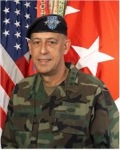 Over a decade of war has changed the fabric of the U.S. armed forces. Short mobilization cycles and changing theater tactics necessitated the development of a learning culture within the organizations. This learning culture, however, is fundamentally NOT the culture that has sustained our premier forces throughout our history. As the armed forces move into a garrison environment and resources diminish, it is time for the culture to shift back to what we fundamentally are…a teaching culture.
Over a decade of war has changed the fabric of the U.S. armed forces. Short mobilization cycles and changing theater tactics necessitated the development of a learning culture within the organizations. This learning culture, however, is fundamentally NOT the culture that has sustained our premier forces throughout our history. As the armed forces move into a garrison environment and resources diminish, it is time for the culture to shift back to what we fundamentally are…a teaching culture.
General Colin Powell, in his autobiography It Worked for Me: In Life and Leadership, explains that he has been a professional speaker, trainer, and teacher his entire adult career. He explains
From my first day in my unit as an Army officer, I had to speak to and teach troops.
General Powell built his success on the enduring Army culture where leaders teach troops and other leaders. They not only learn they pass knowledge on. Instilling the desire to improve and learn is the important part of any the learning culture; A teaching organization further infuses learning with the culture of passing it on to others. Noel Tichy, author of the Leadership Engine puts it this way:
(Organizations) that consistently outperform competitors (have) moved beyond being learning organizations to become teaching organizations….That’s because teaching organizations are more agile, come up with better strategies, and are able to implement them more effectively…. Teaching organizations do share with learning organizations the goal that everyone continually acquire new knowledge and skills. But to do that, they add the more critical goal that everyone pass their learning on to others…. In a teaching organization, leaders benefit just by preparing to teach others. Because the teachers are people with hands-on experience within the organization—rather than outside consultants—the people being taught learn relevant, immediately useful concepts and skills. Teaching organizations are better able to achieve success and maintain it because their constant focus is on developing people to become leaders.
In short, leaders train leaders. (more…)


